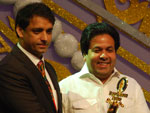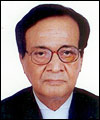Analysis
 Are you dreaming of becoming the next Zia? India is the world's only major legal market where you can still do more than just dream.
Are you dreaming of becoming the next Zia? India is the world's only major legal market where you can still do more than just dream.
Legally India has asked more than a dozen legal entrepreneurs for their advice on how to live that dream.
"If you feel if you are not able to achieve what you want in larger firms with larger brand names, there is enough work to sustain and flourish when you set up on your own," claims Lex Counsel's co-founder Dimpy Mohanty.
Interviews
 Kochhar & Co's founding partner was recently the first practising lawyer to be awarded 'young entrepreneur of the year' at the Rajiv Gandhi Awards.
Kochhar & Co's founding partner was recently the first practising lawyer to be awarded 'young entrepreneur of the year' at the Rajiv Gandhi Awards.
We have quizzed the lawyer and businessman on his passion for enterprise and what it takes to be an entrepreneurial lawyer - apart from following your dreams.
About external articles
 The Bar Council of India (BCI) is displeased about plans to take away legal education from its ambit by the ministry of Human Resource Development (HRD).
The Bar Council of India (BCI) is displeased about plans to take away legal education from its ambit by the ministry of Human Resource Development (HRD).
Interviews
 He was the driving force behind the recent historic judgement that effectively decriminalised homosexuality by 'reading down' section 377 last month. But Anand Grover's battle has been far older than just that case, starting 20 years ago with a series of painful setbacks, death and a growing obsession.
He was the driving force behind the recent historic judgement that effectively decriminalised homosexuality by 'reading down' section 377 last month. But Anand Grover's battle has been far older than just that case, starting 20 years ago with a series of painful setbacks, death and a growing obsession.
Interviews
 Jindal Global Law School (JGLS) wants to redefine India's academic study of law. Its ambitions are high but so is the price of admission – the college has costlier tuition than any other major law school in the country.
Jindal Global Law School (JGLS) wants to redefine India's academic study of law. Its ambitions are high but so is the price of admission – the college has costlier tuition than any other major law school in the country.
Legally India has asked JGLS' founding dean and vice-chancellor of O.P. Jindal Global University to explain the law school's fees and its vision.
Analysis
 For an Indian firm, going under the wing of an international firm is not necessarily as appealing as some might suppose and could even be downright dangerous.
For an Indian firm, going under the wing of an international firm is not necessarily as appealing as some might suppose and could even be downright dangerous.
Interviews
 Legally India caught up with Bar Council of India chairman Suraj Narain Prasad Sinha last week. We asked him about legal education, Australian racism and why allowing foreign law firms to practice here is a bad idea.
Legally India caught up with Bar Council of India chairman Suraj Narain Prasad Sinha last week. We asked him about legal education, Australian racism and why allowing foreign law firms to practice here is a bad idea.
Editorial
This article is only readable by LI’s long-term legacy supporters. Please be patient, it will be live shortly.
News and current affairs
As India goes crazy about Anna Hazare, a small reminder.
In Manipur, a woman called irom Sharmila has been on a hunger strike for 10 years because Media does not highlight that.
Let's now do something for Sharmila.........
Student life
Being a law school student means getting enlightened about various laws for a continuous period of 5 yrs, from cases where some stupid insect was found in Beer bottle that led to whole lot of hoopla regarding it and a resulting landmark case slapped on students, to cases of breach of contract, to promissory estoppels. Furthermore, studying many confusing notions, encountering situations when you feel like murdering the professor to see whether its culpable homicide or murder while he is trying to make you understand the difference between the two! There is so much more to it, sleepy classes of Procedural laws, complexities of Constitutional law, times when mind stops interpreting while reading Interpretation of Statues or the burden of Tax laws!
Source: http://lawschoolsterrace.blogspot.com/2011/02/being-law-student.html
News and current affairs
We won!!! After a massive and unprecedented outpouring of public pressure,the government has given in and met all of Anna Hazare's demands!!
Over 500,000 of us signed the petition - at one point 30,000 people per hour! The petition was widely covered in the national press as evidence that the anti-corruption movement was growing like wildfire across the nation -- ramping up the pressure on the government.
This is just the beginning -- there will be more chances for corrupt politicians to stop this bill -- but if we stick together, we can make this the beginning of the end for the poisonous culture of corruption that stifles this nation. Let's take this moment to celebrate together, thank each other, and share thoughts for all the possibilities of the road ahead. Click below to join a live chat of our entire community:
http://www.avaaz.org/en/anna_hazare_victory/?vl
The government delivered a signed commitment to Hazare this morning at 10am, promising to accept a committee to finalize the drafting of the jan lokpal bill that is 50% composed and led by civil society. PM Singh further promised to table this bill for a vote by the next parliamentary session. In response, Hazare has declared an end to his fast.
The country is buzzing with excitement and optimism at this tremendous victory. We've received a flood of emails of enthusiasm and support. Everyone is saying that this is like the return of the satyagraha movement - to liberate India once again from a new kind of tyranny. But this time Satyagraha has a powerful ally in technology and the way citizens can rapidly mobilize online to join and strengthen the call for change.
Jan Lokpal will set up a truly independent body that investigate and charge corruption anywhere in the government, even the PM's office. It is a dagger aimed at the heart of corruption. Many politicians will do everything they can to stop it, and it will take all of our vigilance and commitment to make sure it becomes law. But it will become law, because today showed that people power is stronger than any corrupt politicians, and now that we know that, there's no going back. A new India is being born, let's build it together.
News and current affairs
Right now, Anna Hazare, a 73-year-old Gandhian, sits fasting in the burning sun, and he will stay until death -- unless the government agrees to consider a powerful law that could rid Indian politics of the scourge of corruption.
This “Modern Mahatma” is taking the utmost act of courage and determination to push through a bill that would give an independent body the power to punish corruption -- even in the Prime Minister’s office. Across the country a movement has exploded, driving a media storm of pressure that’s engulfing Singh. But dirty politicians are desperately trying to water down or kill the law.
For the first time in forty three years, we have the chance to change the way politics is done. Let's join together and stand with Anna Hazare to tackle corruption and clean up Indian politics. We have no time to lose -- sign the petition to be delivered directly to Prime Minister Singh and reported to the media, and spread the word to everyone:
Click here to sign the petition!--http://www.avaaz.org/en/stand_with_anna_hazare/?slideshow#top
Hazare is championing a citizen-developed bill called “Jan” Lokpal that will create an independent body, selected by judges, citizens and constitutional authorities, with enough power to investigate and punish all politicians. No minister or bureaucrat will be able to influence its investigations.
Since 1968, when this bill was first introduced, greedy politicians have thwarted its passing. Now the government is pushing for a watered down Lokpal with no hope of ending fraud, vice and dishonesty -- it gives politicians overriding power to decide who will be investigated, and is a complete sellout.
Pressure is mounting on Prime Minister Singh to endorse the "Jan" Lokpal. Members of the opposition party have begun to make the right noises in support of Anna Hazare. And even the National Advisory Council, a powerful advisory body to Sonia Gandhi have come out in favour of the bill. But corrupt politicians and vested interests are doing all they can to kill it.
Anna Hazare has set the example. But only a national citizens movement can ramp up the pressure to get Singh to endorse “Jan” Lokpal and save Hazare's life.
Click here to sign the petition!__http://www.avaaz.org/en/stand_with_anna_hazare/?slideshow#top
Corruption in politics has become a plague across our country, it is draining our resources and demoralizing our nation. This bill would go a long way to deterring those that steal and undermine the public good. Last year, the Avaaz community in Brazil won an important victory -- against the odds millions of people came together and pushed through a historic anti-corruption law. India has a proud history of people power overcoming oppression -- today if we all stand with one voice we can fight this corruption that is poisoning our political system.
Legal argument
(1) A note was struck by Apex Court in Superintending Engineer, Public health, U.T. Chandigarh V Kuldeep Singh when it observed: “Every Public servant is a trustee of the society; and in all facets of public administration – every public servant has to exhibit honesty, integrity, sincerity and faithfulness in the implementation of the political, social, economic and constitutional policies to integrate the nation, to achieve excellence & efficiency in public administration. ...”
Contrary to above, the experience is that the holders of public offices treat the authority in their hands, as one bestowing upon them, the status of a ruler rather than one in public service.
Statutory / Public authorities / Public officers, especially highly placed, soaked in arrogance of their powers, generally do not bother themselves to the complaint of Citizens, and their replies sometimes are deliberately illogical and evasive. This essay seeks to engineer an effective answer to deal with this menace.
(2) We, the people of India have so many rights, under the Constitution and under various Statutes, and I thought let us contemplate one more right, that is “Right of Reply”. It is my case that Citizens’ have a right to receive proper reply, of the complaints made to public / statutory authorities.
(3) In fact, in the case of Salem Advocates Bar Association, Tamilnadu Vs. Union of India (UOI), (2005) 6 SCC 344, the Hon'ble Supreme Court, among other things, said - Judicial notice can be taken of the fact that in a large number of cases either the notice is not replied to or in the few cases where a reply is sent, it is generally vague and evasive. It not only gives rise to avoidable litigation but also results in heavy expenses and costs to the exchequer as well.
A proper reply can result in reduction of litigation between the State and the citizens. In case a proper reply is sent, either the claim in the notice may be admitted or the area of controversy curtailed, or the citizen may be satisfied on knowing the stand of the State
In the above case strict duty is cast upon the Public authorities to make proper replies if they happen to receive any statutory notice, either under section 80 of CPC 1908, or under any other statute. I say, when a law recognizes a duty, correspondingly, law also recognizes a right.
(4) It is my case that Citizens’ Right of “Reply” can be traced to preamble and to Article 14 of the Constitution of India and in numerous rulings made by our Constitutional courts. In wealth of the Judgments delivered by our Courts, it is repeatedly affirmed that public authorities must exercise their discretionary powers in a reasoned and justified manner, failing to which leads to inescapable violence to Article 14 of the Constitution of India.
Citizen’s “Right of Reply” is inherent in “Duty to reasoned exercise of discretion by Public authorities”, a duty which is consistently cast upon public / statutory authorities by our Constitutional Courts, in their series of judgments.
(5) It is my case that when the Courts, in their wealth of judgments, lay so much emphasize on recording of reasons by public authorities, in the discharge of their duties even when administrative in nature, the recording of reason in their decision itself presupposes the obligation of giving reply, and not only a mere reply but a reasoned reply. It cannot be said that – whereas authorities are under obligation to make reasoned reply but they are at liberty to not to make any reply.
(6) It is my case that in wealth of judgments, the Courts have insisted upon recording reasons by administrative authorities on the premise that such a decision is subject to judicial review and the courts cannot exercise their duty of review unless courts are duly informed of the consideration underlying the action under review. A statement of reasons serves purposes other than judicial review inasmuch as the reasons promote “thought” by the authority and compel it to cover the relevant points and eschew irrelevancies and assures careful administrative consideration.
(7) When, in the case of M Krishna Swamy versus UOI reported in (1992) 4 SCC 605, the Hon’ble Supreme Court held that any action, decision or order of any statutory or public authority bereft of reasoning would be arbitrary, unfair and unjust violating article 14 of the Constitution of India, then, it is my case that non-reply of any complaint received by any public /statutory authority, is a positive act of omission, an arbitrary, unfair and unjustified decision of that public / statutory authority to not to make a reply, thereby frustrating citizen’s fundamental right enshrined under Article 14.
(8) When, in the case of Srilekha Vidyarthi versus State of UP reported in AIR 1991 SC 537, it was held by the Hon'ble SC that in order to satisfy the test of Article 14, every State action must be informed by reasons and that an act uninformed by reasons, is arbitrary, and arbitrariness is the very negation of the Rule of Law, it is my case that non-reply of any complaint received by State, is an act of omission of the State not informed by reason and thus arbitrary, and thus does not pass the test of Article 14.
(9) Similarly, when, in the case of Union of India Vs Mohan Lal Capoor reported in (1973) 2 SCC 836, the Hon’ble Supreme Court said – Reasons disclose how the mind is applied to the subject matter for a decision whether it is purely administrative or quasi judicial; and reveal a rational nexus between the facts considered and conclusions reached, it is my case that non-reply of any complaint received by any public /statutory authority implies that although mind was applied to the complaint and arbitrary decision was taken by the administrative authority that no reply should be made.
(10) Discretion in reality means a power given to a person with the authority to choose between two or more alternatives or possibilities each of which is lawful and permissible. The concept of discretion imports a duty to be fair, candid and unprejudiced; not arbitrary, capricious or biased; much less, warped by resentment or personal dislike.
(11) I say that our system of governance is founded on the lofty principle of rule of law, wherein the Nation’s power is divided amongst three chief organs, each under a duty to conduct itself in a manner that subserves the common good of all and achieve the objectives of a welfare State. The checks and balances were put as inherent safeguards designed to ensure compliance with the maxim “Be you ever so high, the law is above you”. The dicta of the Constitution is crystal clear; namely, the goal of good governance.
(12) I say that even our Constitution of India give so much importance to the people of India. In our vast, beautiful, geographical landscape of Independent INDIA, i.e. Bhaarat, the Constitution of INDIA, which came into existence on 26th January 1950, is the supreme & fundamental governing volume.
This epic governing volume makes a categorical announcement in the introductory passage that people of INDIA are the architect of this volume. The announcement assumes significance because by this announcement, the fathers of our Constitution intend to acknowledge and give tribute to selfless sacrifice of every men & women who devoted their only life for the independence of INDIA. This announcement is intelligent, designed and purposeful.
There are three chief organs outlined in the Governing volume called Constitution of India - they are Legislature, the Govt and the Judiciary, and all these three organs derive their origin and all powers from this peoples' governing volume.
(13) Also, it is my case that, when the Hon’ble Chief Justice of India Shri S H Kapadia on 15.05.2010 warned the PIL Petitioners that they must first issue notice to the Govt / Public authority before moving courts, and therefore, we the People expect, in principle and in equity, that if that public authority / govt turn a blind eye to the notice and if one has to move court for justice, then this Hon'ble court will also find the occasion to direct that the Govt / Public authority to effectively deal with the issue raised in the complaint / notice.
(14) Recording of reasons will show application of mind and probably this recording of reasons is the only remaining visible safeguard against possible misuse of powers conferred upon administrators of a nation.
(15) I seeks to recall an historic incident of Indian freedom struggle, occasioned with Mohandas Karamchand Gandhi (His Journey towards Mahatma). In the year 1893, when in South Africa, while holding a First Class Compartment ticket and travelling in, Gandhi was thrown out of the train, for in those times “Blacks” were not allowed to travel in the First Class Compartment, notwithstanding they hold a valid ticket. It was 9.00 in the chill night. That designated “Black” sent a Telegram to the General Manager of the Railways and registered his complaint. The Complaint of that designated “Black” was attended, forthwith, the General Manager instructed the Station master to secure that complainant reaches his destination safely. Complainant was accommodated in the very next morning train to his destination. And here, in the era of INDEPENDENCE and 21st Century of modern democracy, we have Citizens of Sovereign India, of whose complaint are ordinarily, attended with great disrespect and sometimes with hostility.
(16) It is my case that grievance of the people must be promptly and properly attended instead of waiting and allowing for it to be translated into court litigation.
(17) It is my case that the giving of satisfactory reply is a healthy discipline for all who exercise powers over others.
(18) It is my case that a complaint to State is the most legitimate incident of a democracy.
(19) It is finally my case that satisfactory replies to complaints are not of some importance but of fundamental importance in State Citizen relationship.
And therefore, it is necessary to trace the evolution and development of law, the emergence of concept of subject & the ruler, and trace the origin of today's concept of Citizens & the State.
At the advent of Human Civilization, ‘Men’ were Sovereign in their own, in the sense that, they were free and were not subject to or bound by any law. Then, men were Ruled by their own conscience and not by codified laws and were even free to the extent of inflicting violence at their will & strength, i.e. Might is right was the scene. Men were guided by own conscience and greed. An action not emanating from reason and the freedom to do as one pleases.
Great Philosopher Thomas Hobbes ( 1588- 1671) says that prior to concept of Statehood, the man lived in chaotic conditions of constant fear. The life in the state of nature was solitary, poor nasty, brutish and short. For getting self protection and avoiding misery and pain, man voluntarily entered into a contract and surrendered their part of freedom to some might authority, who could protect their lives and property, which emerged later on as the ruler and which ultimately culminated into the shape of the State.
With the great passage of time and centuries together, Codified laws evolved and were introduced in human life. Men came together, they voluntarily surrendered their individual sovereignty to State sovereignty, and opted to subject themselves to laws of the land, however, they were promised, in return, the Rule of codified laws. The rule of codified laws purported to promise the safety of their life & their property and also sought to guarantee the general dignity inherent in human person alonwith guarantee that he will not be discriminated. This is how the ancient Social contract between Men & State came into being.
Among various definitions of State given by Scholars of law and by Philosophers, this appears to be more satisfactory and convincing. It is by professor Goodhart. He defines State in terms of its purpose. He states that the purpose of society which we call a State is to maintain peace and order within a demarcated territory. THE MINIMUM AND ESSENTIAL PURPOSE OF THE STATE IS TO MAKE LIFE POSSIBLE
Hugo Grotius (1583-1645) is regarded as the father of philosophical jurisprudence. He said- it is the first duty of the Sovereign State to safeguard the citizen because State was given power only for that purpose.
And therefore, in the backdrop of this ancient social contract, every Society & every Individual Citizen has certain basic assumptions to take it for granted that complaints made to State will be replied.
And where public / statutory authorities don’t reply to complaints, or reply in interplay of words and in genius pretence, than, in my view, the appropriate approach may be, if at all the aggrieved person wishes to move the court of law, to only request said High Court to direct that public / statutory authority to make a Reasoned reply to the Petitioners herein of their complaint dated 00.00.0000. The recording of reasons must not only be intelligible but which will also deal with the substantial points which has been raised therein in the complaint and cover other relevant points and eschew irrelevancies and reply which demonstrate that the authority has given due consideration to the points in controversy and that decisions of the public / statutory authority on the issue raised in the said complaint have been reached according to law.
The most important advantages is that if Writ is filed for this limited purpose, than it may be disposed off in the first hearing, because for passing this order, the Court may not even hear the concerned Public / Statutory authority and may straight away pass order. Secondly, if any such order is passed, than that public / statutory authority is bound to make a reasoned and proper reply, in a time bound manner.
Pls find file attached of -
Format of Complaint which may be used;
Format of Writ Petition which may be used;
Relevant wealthy Judgments are discussed in format of Writ Petition.
Sandeep Jalan
Advocate
Mumbai.
Cartoons

Legally Drawn is created by Vasanth Sarathy and is published on his blog www.legallydrawn.com
We will be featuring his future cartoons on Legally India.
News and current affairs
The budget of 2011 presented on 28th February of this year by Finance Minister Pranab Mukherjee was reflection of the economy being back to pre crisis trajectory, marking the growth at 8.6% for 2010-11 and provided blueprint for 9% growth rate in the coming fiscal year.
Merits: The Government efforts of debt management and effective control of fiscal deficit are noteworthy, the roadmap laid to bring down government deficit from existing 5.1% to 4.1% for 2011-12 against 13 Finance Commission’s mandate for 4.8% shows the fiscal prudence of the Government of India. The initiatives of fiscal consolidation, rolling out Direct Tax Code and Goods & Services Tax will provide for Simplification of laws, improvement in collection mechanisms and uniformity in tax structure. The government efforts to concentrate this budget on often neglected sectors, provides this budget to be socially concerned especially in areas such as Microfinance , women self help group, rural infrastructure, self employment and Small Industries. The urban assistance in the form of extending priority sector lending to Rs.25Lacs for housing loans will boost the growth of infrastructure, along with increase in FII for infrastructure bonds are positive factors. The inflationary pressure continues to be troublesome to the Government, the reasons assigned by Finance Minister was perishable goods which constitute 70% of the Wholesale Price Index (WPI), allocation of Rs. 7850 crore under Rashtriya Kisi Vikas Yojna and licensing 30 Mega Food Parks will lead to a new era in Indian Agriculture. The extension of Green Revolution to North – eastern States and allocation of funds for this region are praiseworthy. This budget also provided for doubling the salary of existing Anganwadi workers from Rs.1500 to Rs. 3000. Reaffirming the goal of universalisation of secondary education appears to be effective strategies for the Indian development Mission.
Demerits: This budget provided for the control of fiscal deficit but the governance deficit still remains a concern, the number of central government schemes stand at 200, no efforts are taken to consolidate these schemes for effective implementation and control. Secondly, the transfer of subsidies after the awaited recommendation of Nandan Neilkani’s report will be done only at the end of this fiscal year; therefore it will have no implications in this Fiscal year. Thirdly, No administrative and technical platform was provided for DTC and GST rollout and this budget appears to be only a futuristic budget with all promises and no rewards.
Budget's effect on legal Industry :
This budget expanded the scope of legal services to include services provided by business entities to individuals as well as representational and arbitration services by individuals to business entities.However, there is no taxation on services by individuals to other individuals. For Legal Consulting firms, the code is that they will have to pay service tax even when the clients are individuals. Invitation to taxation also comes from the Arbitrations.The Service tax will be levied on the tribunal arbitrating for a business entity.